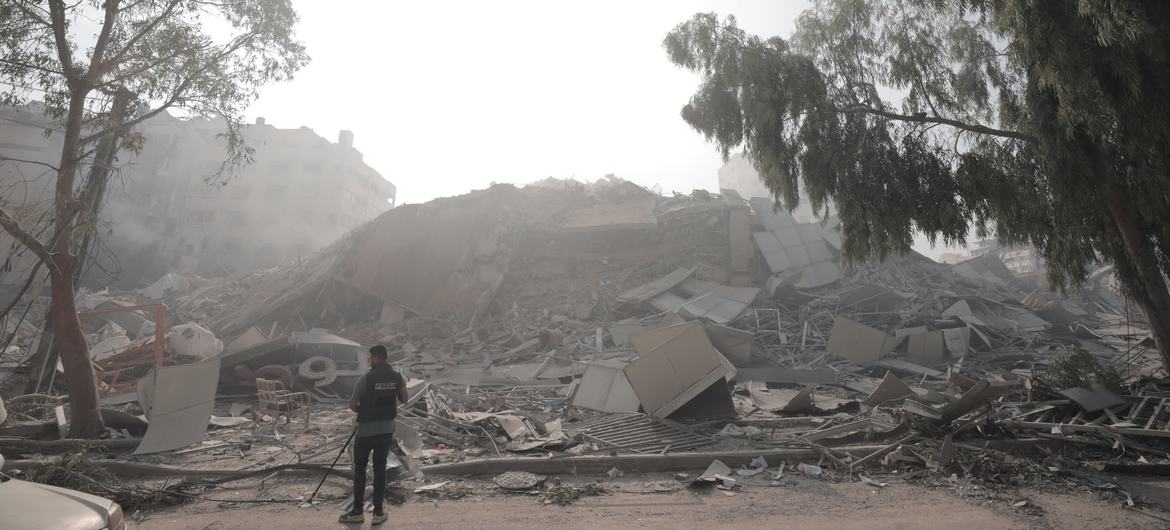
Israel/ Palestine: UN urges parties to spare civilian lives
© UNRWA/Mohammed Hinnawi | A man looks over a collapsed building in Gaza.
United Nations, 10 October 2023
In Israel and the Occupied Palestinian Territories, all parties must stop targeting civilians and Hamas and other armed groups must immediately release their hostages, UN rights chief Volker Türk said on Tuesday.
The High Commissioner said that he was “deeply shocked and appalled by allegations of summary executions of civilians, and, in some instances, horrifying mass killings by members of Palestinian armed groups”.
“It is horrific and deeply distressing to see images of those captured by Palestinian armed groups being ill-treated, as well as reports of killings and the desecration of their bodies. Civilians must never be used as bargaining chips,” he insisted.
Avoid ‘collective punishment’
Four days since Hamas and Palestinian Islamic Jihad launched an attack including thousands of indiscriminate rockets that have reached central Israel, Mr. Türk also warned against indiscriminate or disproportionate action against Gaza and expressed concern over the “full siege” of the territory ordered by the Israeli authorities on Monday, shutting off electricity, water, food and fuel supplies.
He stressed that collective punishment of an entire population was prohibited under international humanitarian law.
Displacement continues ‘en masse’
UN humanitarians briefing the press in Geneva on Tuesday underscored the dire conditions faced by civilians in Gaza, where nearly 140,000 newly displaced people have been sheltering in schools run by the UN agency for Palestine refugees, UNRWA.
UNRWA spokesperson Tamara Alrifai told journalists that displacement continued “en masse” and that while the agency had significant experience turning its schools into shelters, the scale of the crisis was overwhelming.
UNRWA a ‘lifeline’
Complicating the response was the fact that airstrikes have damaged 18 UNRWA facilities in the Gaza Strip, including a school for the visually impaired and the agency’s headquarters in Gaza City, Ms. Alrifai said.
Speaking from Amman, she underscored that all UN buildings are protected under international law, and that the 1.7 million Palestine refugees in Gaza, the majority of whom are living under the poverty line, “use UNRWA as a lifeline” for food, education and health.
She said that the agency was about to issue a flash humanitarian appeal to seek support for the crisis response.
Ms. Alrifai also refuted allegations that Hamas fighters may be using UNRWA facilities for their operations, stressing that dedicated teams conduct inspections of facilities to “make sure that they are immune to use by any warring party or armed groups”.
“We take this extremely seriously,” she insisted.
Calls for a humanitarian corridor
Echoing the humanitarian concerns, the UN health agency WHO said that as of Monday, 13 health attacks have been confirmed in the Gaza Strip since the beginning of the current offensive.
WHO spokesperson Tarik Jasarevic told reporters that a humanitarian corridor is needed to reach people with critical supplies and that the agency is “working on this” with its partners.
He said that since before the latest crisis WHO has been providing supplies, training health workers and supporting emergency response plans, but that supplies pre-positioned in seven major hospitals in the Gaza Strip have now been used up.
Massive mental health needs
Mr. Jasarevic also underscored the soaring mental health needs triggered by the crisis, including the psychological trauma of the hostages taken by Palestinian armed groups. He stressed that the most important thing for those held captive and “going through these horrific moments” was to be released, and that they needed physical and mental care.
UN Children’s Fund (UNICEF) spokesperson James Elder said that the agency had experts in psychosocial support in Gaza and in the West Bank ready to provide assistance to those who needed it.
‘Listen to the children of Gaza and Israel’
“When you listen to the testimonies coming out of Gaza, from children in Israel, it is consistent stories of fear, of suffering, of pain,” Mr. Elder said.
“We have to listen to those children of Gaza and of Israel who are very clearly and usually through tears saying, ‘Enough. Leave us alone.’”
According to UNICEF, before the current escalation, over one million children were already in need of humanitarian aid in the Gaza Strip and the West Bank, accounting for approximately half the child population.
The original article appeared here.